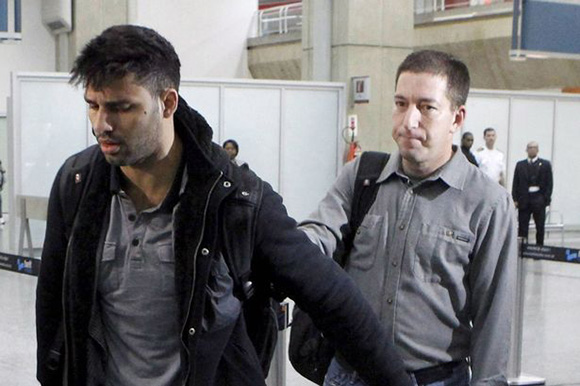by Barry Sheppard
September 2, 2013
When Edward Snowden gave his first public interview in Hong Kong, he said his greatest fear was the possibility that his revelations would fall on deaf ears and be ignored. If that had happened, then his great personal sacrifice would have been for naught.
Snowden and Chelsea (formerly Bradley) Manning have indeed paid a steep price for revealing to the American people and the people of the world the war crimes and massive Constitutional violations by the U.S. government against its own citizens and its vast collection of electronic communications worldwide.

Manning escorted away after being sentenced.
Manning was sentenced to 35 years in a military stockade for telling the truth, and Snowden has been forced into exile, hunted down by the criminal administration in Washington. But their sacrifice has not been in vain: in a real sense, Manning and Snowden have met their objective of initiating a serious discussion of these matters nationally and internationally, whatever further crimes may be inflicted on them.
Snowden’s revelations, coming after those of Manning, changed the context of Manning’s court-martial. The exposure of the secret NSA programs caused many to begin to call into question Washington’s real intentions in prosecuting the soldier.
Julian Assange said Manning’s sentence was a partial victory, in that it was much less than what the administration wanted. The prosecutors argued strongly for a life sentence without the possibility of parole for “aiding the enemy” – in essence, treason. Having lost that in the atmosphere created by Snowden’s revelations, their final demand was a sentence of 60 years, a virtual life sentence.
Manning’s lawyers say she will be eligible for parole in about seven more years, having been given credit for the over three years she has already been held in prison, which included some months of torture. Her defense now moves into a new phase. After she was sentenced, Manning issued a strong open appeal to President Obama for a pardon. That will be pursued legally.
Then Manning came out publicly that she would now live her life as a woman, and changed her name to Chelsea. She said she would seek medical treatments to change her physical body accordingly. The army immediately responded that it would allow no such treatments. Now Chelsea is challenging that in the courts. This is part of the fight for her to receive fair and good treatment in prison in general. These campaigns will help keep her case in the public eye, and prepare, if necessary, to fight for her early release at the first opportunity for parole.

Chelsea Manning.
The New York Times editorialized that Manning’s sentence was “excessive,” while saying [s]he deserved some punishment because [s]he broke the law by revealing classified documents. While Manning should not have been charged at all, but commended for her public service in releasing the documents she did, the Times’ position reflects a division in the ruling class concerning the Manning-Snowden revelations. Another indication was the close vote in the House which almost defunded the NSA’s program of monitoring every phone call in the U.S. Obama himself noted the unease in the country over the NSA’s spying.
The Times also ran a lengthy article in its Sunday magazine of August 18 about how Laura Poitras, journalist and film-maker, worked with Snowden and Glenn Greenwald to get his revelations out to the world. Her photo was on the paper’s cover, with the headline “How Laura Poitras helped expose what the American government does in the name of security.” The article portrayed Snowden, Poitras, and Greenwald as quite intelligent in how they circumvented the U.S. repressive apparatus, and was sympathetic to their cause.
Another aspect of the struggles for freedom of information is freedom of the press, even the capitalist press. The Justice Department is seeking to force New York Times reporter James Risen to testify in their case against former CIA officer Jeffry Sterling. They allege that Sterling leaked classified information to Risen who used it to write about the CIA. So far Risen has resisted testifying, but he might face contempt of court charges.
The administration would like to move against the Times and other papers for printing some of Manning’s and Snowden’s revelations. They fear to create a backlash, however. Now some officials and people in Congress are seeking to put organizations like WikiLeaks in a new category of “non-legitimate” journalism which would not be protected by the Constitutional guarantees of freedom of the press. Such a move would raise its own problems for the ruling class, for example for reporting by social media. Would a teenager who posted Snowden’s documents be fair game for the spooks?
It is quite likely that Julian Assange is already under secret indictment, probably citing the Espionage Act, for publishing Manning’s material as well as aiding Snowden. A section of the ruling class doesn’t want to go that far in tearing up the Bill of Rights.
Another cause for concern in ruling class circles has been the wide international repercussions of Manning’s release of State Department cables which were embarrassing to the government, and revelation of the wide international net of the NSA’s spying. A recent release of Snowden documents by Greenwald reported in Der Spiegel of new information of U.S. spying on Germans has created consternation in that country. Even German Chancellor Merkel has raised the need for a mutual pact with the U.S. against spying on each other’s government, citizens, and businesses, a suggestion that Obama doesn’t even deign to reply to.
Another new revelation is how the NSA has broken into the encrypted discussions in United Nations delegations, in violation of UN rules. The ham-fisted way the U.S. and Britain have gone after Snowden for these revelations has increased international concern. Washington’s attempts to capture Snowden, going so far as to force down an official plane carrying the President of Bolivia, has created an uproar in Latin America.

Glenn Greenwald with partner David Miranda.
Adding to drama around Greenwald’s release of information of U.S. spying on Brazil, where he is living, was the detention of Greenwald’s companion David Miranda for nine hours at London’s Heathrow airport. Miranda was on his way back to Brazil from a meeting in Berlin with Laura Poitras, who is working with Greenwald on further Snowden releases.
The British political police claimed they were acting under a law to ferret out information about terrorism. “What’s amazing is this law, called the Terrorism Act, gives them a right to detain and question you about your activities with a terrorist organization or your possible involvement in or knowledge of a terrorism plot,” Greenwald said.
But the spooks didn’t even raise anything about terrorism when they grilled Miranda. “The only thing they were interested in was NSA documents and what I was doing with Laura Poitras,” Greenwald noted. The Brits then confiscated all Miranda’s electronic documents and equipment. A court later ruled that his computers and records would have to be returned to Miranda, but gave the police seven days to first copy them.
The Brazilian government strongly objected. Obviously, London didn’t do this on its own, but in collaboration with Washington.
The British political police also threatened to shut down The Guardian newspaper, its editor, Alan Rusbridger, has revealed. This was in retaliation for the paper’s publishing material from Wikileaks and Greenwald. The police said they would shut down The Guardian unless it turned over its hard drives containing the leaked material, or destroyed the hard drives. Rusbridger decided to do the latter, and destroyed them under the watchful eyes of three police thugs. This might seem ridiculous since the material on the hard drives exists elsewhere–the intent was clearly to intimidate.

The remains of the hard drive destroyed by The Guardian. Photo by Roger Tooth.
The credibility of the U.S. administration has been damaged, both by what Manning and Snowden have revealed (and there is more to come), and by the violent way it has responded to the leaks. That this has caused consternation at the top presents new opportunities to expose the truth about Washington’s crimes. When the thieves fall out, we should take advantage.
Barry Sheppard is a member of Solidarity in the Bay Area. He has written a two-volume political biography about his time as a leading member of the Socialist Workers Party. He writes a weekly letter from the U.S. for the Australian Green Left Weekly and Socialist Alternative magazine, where this article also appears.
